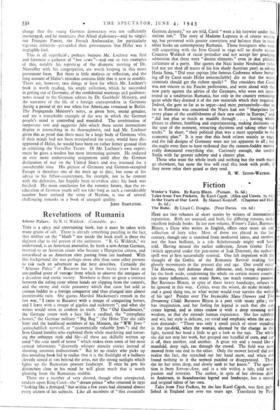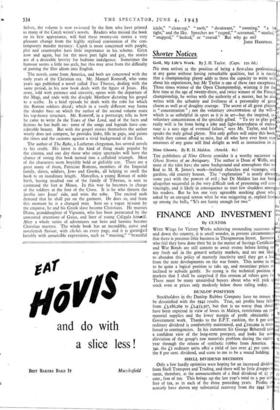Fiction
Winter's Tales. By Karen Blixen. (Putnam. 13s. 6d.)
Tales from Two Pockets. By Karel Capek. (Allen and Unwin. 7s. 6d.) In the Years of Our Lord. By Manuel Komroff. (Chapman and Hall. 85. 6d.)
The Robe. By Lloyd C. Douglas. (Peter Davies. 12s. 6d.)
}LIRE are two volumes of short stories by writers of international reputation. Both are unusual, and both, for differing reasons, make excellent bedside books. In her new volume, Winter's Tales, Baroness Blixen, a Dane who writes in English, offers once more an odd collection of fairy tales. Most of them are placed in the last century, though one is snatched from mediaeval times, and another, not the least brilliant, is a tale Scheherazade might well have told. Having missed the earlier collection, Seven Gothic Tales (which appeared under the pen-name of Isak Dinesen), the author's spell was at first successfully resisted. One felt impatient with the thought of the Gothic of the Romantic Revival making last ghostly movements in the present day and age. One could reject The Heroine, feel dubious about Alkmene, and, being impatient, lay the book aside, condemning the whole on certain minor counts ; too many influences, too many flaws, too much romantic passion. But Baroness Blixen, in spite of these heavy handicaps, refuses to be-ignored in this way. Critics, even the wisest, do make mistakes, and a good thing too, or what writer would ever survive the welter of his age? Ponder over The Invincible Slave Owners and The Dreaming Child: Baroness Blixen is a poet with many gifts ; she has imagination, and her feeling for legend is such that she can create legend, and at times endow it with a deep meaning and wisdom, so that she extends human experience. She has subtlety and wit, her style is delicate, yet vivid and emphatic when the occa- sion demands: " There was only a small patch of straw standing in the rye-field, when the woman, alarmed by the change in the light, turned her head a little to get a look at the sun. The while she did not stop her work, but grasped one handful of corn, and cut it off, then another, and another. A great stir and a sound like a manifold, deep sigh, ran through the crowd. The field was now mowed from one end to the other. Only the mower herself did not realise the fact, she stretched out her hand anew, and when she found nothing to it she seemed puzzled or disappointed. Then she let her arms drop, and slowly sank to her knees." The quota- tion is from Sorrow-Acre, and is a tale within a tale, told with passion and restraint. The author, in spite of her obvious debt to Andersen, to Scandinavian legend and landscape, has a strong and Original talent of her own.
Tales from Two Pockets, by the late Karel Capek, was first pub- lished in England lust over ten years ago. Translated by Paul
Selver, the volume is now re-issued by the firm who have printed so many of the Czech writer's novels. Readers who missed the book on its first appearance, will find these twenty-six stories a very pleasant change from the highly stylised convention of the con- temporary murder mystery : Capek is more concerned with people, plot and counterplot have little importance in his scheme. Grim now and again, but for the most part light and gay, the stories are of a desirable brevity for bedtime indulgence. Sometimes the humour seems a little too arch, but this may arise from the difficulty of putting the Slav idiom into English.
The novels come from America, and both are concerned with the early years of the Christian era. Mr. Manuel Komroff, who some years ago published a novel called Two Thieves, dealing with the same period, in his new book deals with the figure of Jesus. His story, told with patience and sincerity, opens with the departure of the Magi, and ends with the disciple Matthew dictating his gospel to a scribe. In a brief episode he deals with the robe for which the Roman soldiers diced; which in a vastly different way forms the slender base on which the author of the second volume rears his top-heavy structure. Mr. Komroff, in a postscript, tells us how he came to write In the Years of Our Lord, and of the facts and fictions he has built on: some of the songs and legends have con- siderable beauty. But with the gospel stories themselves the author wisely does not compete, he provides links, fills in gaps, and paints the times and the customs against a vivid background of the East.
The author of The Rpbe, a Lutheran clergyman, has several novels to his credit. His latest is the kind of thing made popular by the• cinema, and one day those who enjoy spectacles will have the chance of seeing this book turned into a celluloid triumph. Most of the characters seem boyishly bold or girlishly coy. There are a great many of them, Patrician Romans, members of the Imperial family, slaves, soldiers, Jews and Greeks, all helping to swell the book to an inordinate length. Marcellus, a young Roman of noble birth, having insulted one . of the family of Tiberius, is sent to command the fort at Minoa. In this way he becomes in charge of the soldiers at the foot of the Cross. It is he who thrusts the javelin into Jesus' side, and wins the robe. The excited mob demand that he shall put on the garment. He does so, and from this moment he is a -changed man. Sent on a vague mission by the emperor, he and his 'Greek slave become Christians. He marries Diana, granddaughter of Vipsania, who has been persecuted by the unwanted attentions of Gaius, and later of young Caligula himself. After a whole series of adventures our hero and heroine become Christian martyrs. The whole book has an incredible, naive and novelettish flavour, with clichés on every page, and it is garnished lavishly with unsuitable expressions, such as mussing," " beautiful icicle," " clean-up," " snob," " deodorant," " rooming," " a bk tight," and the hice. Speeches are "rasped," " screamed," " snarled," " snapped," " barked," or "roared." But why go on?
JOHN HAMPSON.



























 Previous page
Previous page